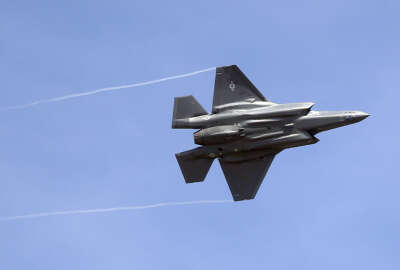
Lockheed will not commit to paying back extra labor costs for F-35
Lockheed Martin failed to deliver parts with the correct electronic information causing $300 million in extra work.
Lockheed Martin will not commit to paying back the Defense Department for hundreds of millions of dollars in additional labor costs related to electronic logs that were not properly delivered with ready-to-issue F-35 parts.
During a Wednesday House Oversight and Reform Committee hearing Greg Ulmer, Lockheed Vice President and General Manager of the F-35 program, dodged a direct question from Chairwoman Carolyn Mahoney (D-N.Y.) on refunding the Pentagon on the work it took to reconcile electronic equipment logs (EELs) with the Autonomic Logistics Information System (ALIS).
“It’s a complex problem,” Ulmer said. “It’s not all associated with Lockheed Martin performance. There are many aspects related to not-ready-for-issue. This electronic file, we are innovating it as we go through this process with our customer. This has been a concurrent program, so we have concurrently developed, produced and sustained this aircraft and the products we used to do that.”
Ulmer said EELs contain sophisticated information with technical and graphical data. He said that data can be corrupted through the business process. Lockheed has seen an improvement from an issue with 50% of the logs to 23%. Ulmer said he was willing to sit down with DoD and “adjudicate the cost appropriately.”
The F-35 is the most expensive weapon ever developed by the United States.
Defense Undersecretary for Acquisition and Sustainment Ellen Lord confirmed that DoD’s Defense Contract Management Agency is negotiating with Lockheed for compensation.
The extra labor costs added up to $300 million over the past five years, and could add an extra $55 million a year if the problem isn’t fixed.
Congress feels Lockheed is responsible for at least $183 million.
All this comes as Lockheed just reported $16.2 billion in net sales in the second quarter of 2020, a 12% increase from the second quarter last year.
“Lockheed Martin’s refusal to reimburse the government troubles me greatly, and for reasons beyond the immediate financial stakes,” Dan Grazier, a fellow at the Project on Government Oversight told Federal News Network. “They are dragging their feet because they can. We have essentially put all of our tactical aviation eggs into the Lockheed Martin basket. Three of our military services have staked their future on the F-35.”
In June 2019, the DoD Inspector General found “DoD did not receive ready-for-issue F‑35 spare parts in accordance with contract requirements.”
Members of the House Oversight and Reform Committee wrote to Lockheed on June 18 stating, “Faulty EELs force maintenance personnel in the Air Force, Navy, and Marine Corps to make difficult decisions. They must choose between reducing readiness by grounding aircraft they believe are unsuitable to fly and ignoring warning alerts that certain parts are missing EELs. The Government Accountability Office reported that F-35 users said that by continuously ignoring alerts in the ALIS caused by missing or inaccurate data, squadrons could be at risk of ignoring an alert for legitimate aircraft issues.”
All of this is further conflated because DoD pays Lockheed incentive fees on sustainment contracts based on the overall performance of the F-35 fleet.
However, in the letter the lawmakers pointed out, “the true aircraft availability of F-35s is inflated because of local policies that allow bases to fly F-35s despite missing electronic logs.”
According to the DoD IG, the military potentially overpaid $10.6 million in performance incentive fees to Lockheed Martin because parts that failed to meet contract requirements were used to fly and perform assigned missions.
“It is a testament to the F-35 program’s excessive complexity that something as seemingly mundane as electronic equipment logs can be bungled so badly as to prompt a congressional hearing,” Grazier said. “Criticism of the program came from both sides of the aisle today in a way that I have rarely seen before. At this point in the program, especially when you consider how much money has been spent, we all expect these issues to be resolved.”
Copyright © 2025 Federal News Network. All rights reserved. This website is not intended for users located within the European Economic Area.
Scott Maucione is a defense reporter for Federal News Network and reports on human capital, workforce and the Defense Department at-large.
Follow @smaucioneWFED






